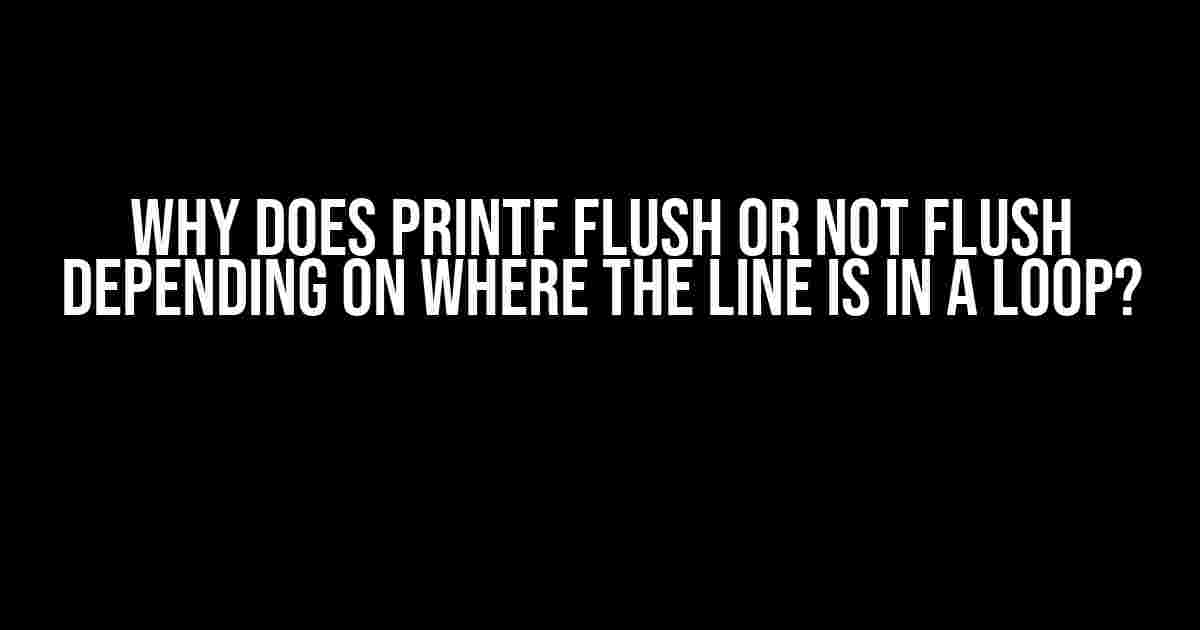Have you ever wondered why your beloved printf function sometimes decides to flush its output buffer and sometimes doesn’t, depending on where it’s placed in a loop? Well, buckle up, friend, because we’re about to dive into the fascinating world of buffering and explore the reasons behind this mysterious phenomenon!
The Buffering Conundrum
In C programming, output streams (like stdout) use a buffer to store characters before they’re actually written to the console. This buffer is usually implemented as a character array, and its size is limited. When you call printf, the characters are stored in this buffer instead of being immediately written to the console. This process is called buffering.
There are three types of buffering:
- Unbuffered: No buffering occurs; output is immediately written to the console.
- : Buffering occurs, but the buffer is flushed when a newline character (
\n) is encountered. - Full Buffering: Buffering occurs, and the buffer is only flushed when it’s full or when the program exits.
The printf Behavior Mystery
Now, let’s consider a simple loop that uses printf to print some messages:
int main() {
for (int i = 0; i < 5; i++) {
printf("Loop iteration %d\n", i);
}
return 0;
}In this example, the output will be printed line by line, and the buffer will be flushed after each iteration because of the newline character (\n) at the end of the format string. This is expected behavior.
But What Happens Without the Newline Character?
int main() {
for (int i = 0; i < 5; i++) {
printf("Loop iteration %d", i);
}
return 0;
}In this case, the output will not be printed until the loop finishes, and even then, it might not be printed at all if the program exits before the buffer is full. This is because the buffer is not flushed automatically when there’s no newline character.
Why Does printf Flush or Not Flush Depending on the Loop Iteration?
The reason behind this behavior lies in the way the buffering mechanism works. When you call printf without a newline character, the characters are stored in the buffer. If the buffer is not full, the output is not flushed, and the program continues executing.
However, when you call printf with a newline character, the buffer is flushed automatically, even if it’s not full. This is because the newline character is a special character that signals the end of a line. When the buffer is flushed, the output is written to the console, and the buffer is cleared.
A loop with a Mix of Newline and Non-Newline Characters
int main() {
for (int i = 0; i < 5; i++) {
printf("Loop iteration %d", i);
if (i % 2 == 0) {
printf("\n");
}
}
return 0;
}In this example, the output will be printed in batches of two, with a newline character separating each batch. This is because the buffer is flushed whenever a newline character is encountered, but not when a non-newline character is encountered.
Best Practices for Handling Buffering in Loops
To avoid unexpected behavior, follow these best practices when using printf in loops:
- Use newline characters wisely: If you want the output to be printed immediately, use a newline character at the end of the format string.
- Flush the buffer explicitly: Use
fflush(stdout)to flush the buffer manually, especially when working with large datasets or in situations where output buffering is critical. - Consider using unbuffered output: If you need to write to the console without buffering, use
setvbuf(stdout, NULL, _IONBF, 0)to set the output stream to unbuffered mode.
Conclusion
In conclusion, the buffering mechanism in C programming can sometimes lead to unexpected behavior when using printf in loops. By understanding how buffering works and following best practices, you can ensure that your output is printed correctly and efficiently.
Remember, when in doubt, use a newline character or fflush(stdout) to force the buffer to flush. And if you’re feeling adventurous, try experimenting with different buffering modes to see how they affect your program’s output!
| Buffering Type | Description |
|---|---|
| Unbuffered | No buffering; output is immediately written to the console. |
Buffering occurs, but the buffer is flushed when a newline character (\n) is encountered. |
|
| Full Buffering | Buffering occurs, and the buffer is only flushed when it’s full or when the program exits. |
Happy coding, and may the buffering forces be with you!
Frequently Asked Question
Get the scoop on why printf behaves mysteriously in loops!
Why does printf only flush when it’s the last statement in a loop?
It’s because of buffering, my friend! When printf is not the last statement in a loop, the output is stored in a buffer, waiting for more data or a flush. But when it’s the last statement, the buffer is automatically flushed to the console. It’s like the printf is saying, “Hey, I’m done! Time to show the world what I’ve got!”
What’s the deal with line buffering and block buffering?
Line buffering means that the output is flushed when a newline character is encountered, whereas block buffering means that the output is flushed when the buffer reaches a certain size. By default, stdout is line-buffered when connected to a terminal, and block-buffered when connected to a file or pipe. This explains why printf might behave differently depending on where it’s redirecting its output!
How can I force printf to flush immediately?
Easy peasy! You can use the fflush function to force the buffer to flush. Just call fflush(stdout) after your printf statement, and voilà! Your output will be sent to the console pronto!
What about the fflush trick? Can I use that to flush printf?
You’re talking about the trick where you append “\n” to the printf format string, and then call fflush(stdout)? Yeah, that works too! The newline character triggers the line buffering, and the fflush forces the buffer to flush. It’s like a one-two punch for getting your output to the console ASAP!
Is there a way to disable buffering altogether?
You want to go full-on unbuffered mode? Well, you can use the setbuf function to disable buffering for a specific stream. Just call setbuf(stdout, NULL) at the beginning of your program, and all output will be unbuffered from then on. But be warned, this can affect performance, so use it wisely!


